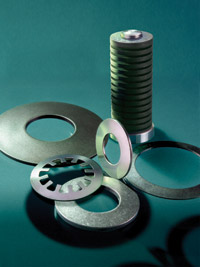
Posted to News on 24th May 2012, 00:00
Continual testing is the key to ensuring product quality, performance and reliability
The Christian Bauer company has developed a comprehensive protocol for corrosion and crack testing on its disc springs and spring pack assemblies. The information gathered has been built into the company's manufacturing programmes and production procedures - a serious approach towards the elimination or minimisation of corrosion effects that ensures Bauer products are an obvious choice wherever arduous or safety critical applications are being considered.

>In the pursuance of product quality, performance and reliability, the Bauer company instigated a research proposal on its own product range, designated as AVIF Proposal Number A210. This covered 'Investigations on the corrosion behaviour of disc springs and disc spring stacks', advised by the Spring Association, Subcommittee on Disc Springs, via the Technical University of Darmstadt, Institute for Materials. Systematic results on the behaviour and durability of disc springs under application-related corrosive conditions were determined.
>When investigating a component currently being used or considered for heavy duty or otherwise critical applications, then the collective stress and potential for corrosion must be analysed precisely. The contributing factors of various corrosion mediums, operating temperatures, together with static or dynamic stress conditions leading to contact wear sites must also be considered, including the way they change over time. Where durability must be guaranteed for reliable, long-term operation, then field testing is also appropriate.
>As well as stainless spring steels, coated ferritic steel with several nickel chrome steel variations were tested in a variety of material thicknesses. A number of protective coatings were also utilised (without phosphating), including mechanical zinc and chemical nickel platings, together with Dacromet 500, Geomet and Delta Tone as well as a simple water thinned lacquer, and a general surface coating with oil. The range of corrosion media utilised in the testing included a saturated sea water atmosphere, 40% magnesium chloride and 3% sodium chloride solutions, together with sodium hydroxide, citric acid and deionised water.
>The corrosion testing procedures included:
>
- Full immersion experiments without stress
- VDA alternating test
- Stress crack corrosion experiments with constant stress
- Stretch-induced stress crack corrosion experiments
- Vibration crack corrosion experiments
- VDA alternating tests with mechanical stress
>Testing protocols were determined for different metals and combined with alternative corrosive media and test procedures to suit operating conditions and stress factors involved.
>Applications for this high performance, high reliability range of disc springs incudes power generation, offshore oil and gas, aerospace, medical or marine tasks, as well as remote site installations where a high degree of 'fit and forget' reliability is required.
Eagle Road
North Moons Moat Industrial Estate
B98 9HF
UNITED KINGDOM
+44 (0)1527 594900








